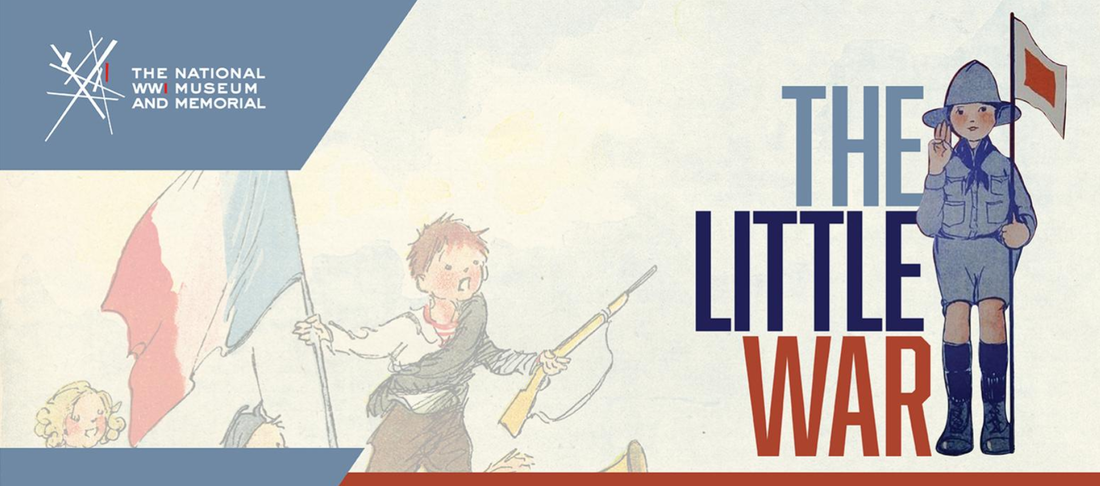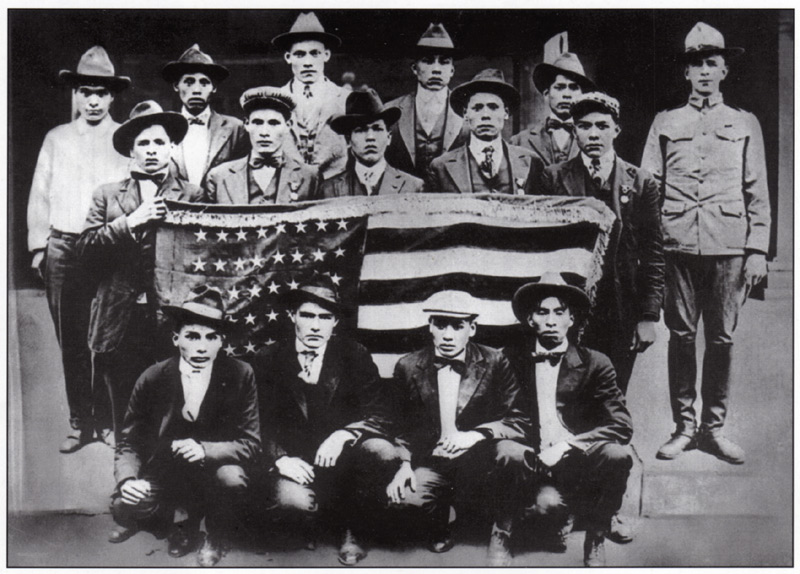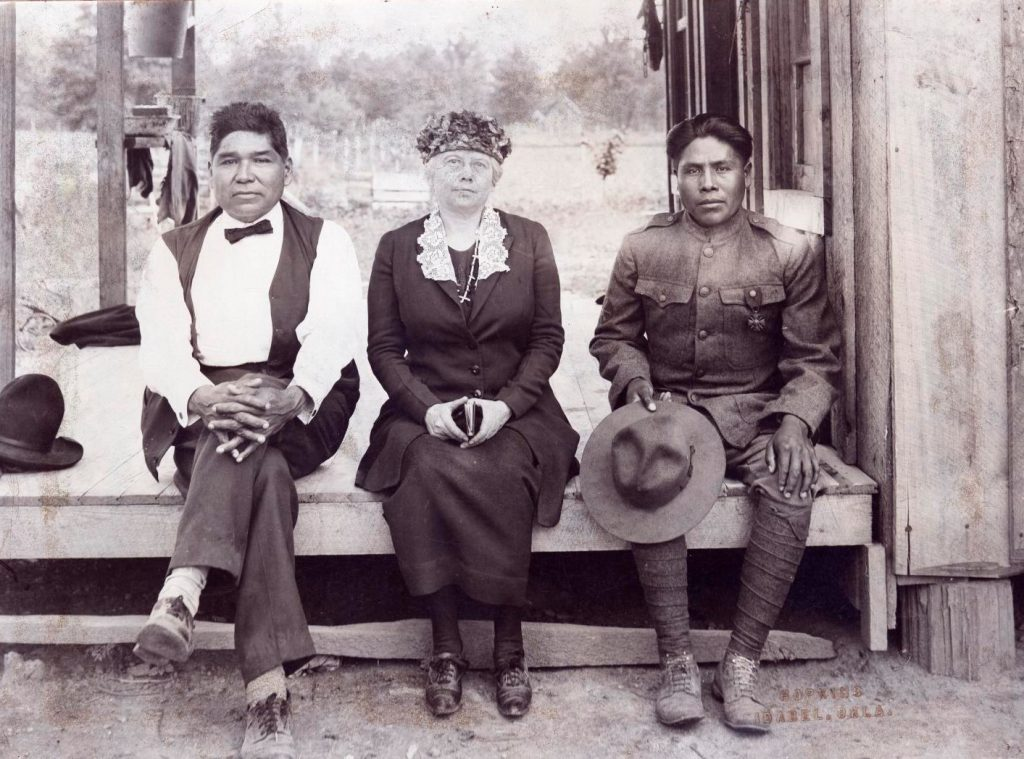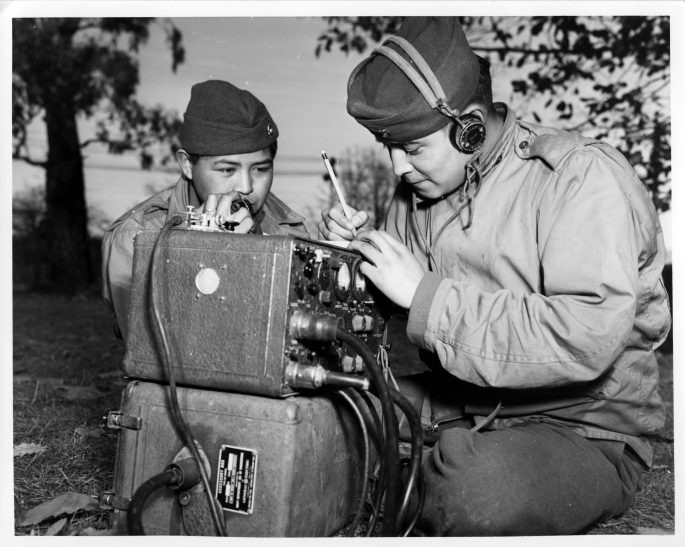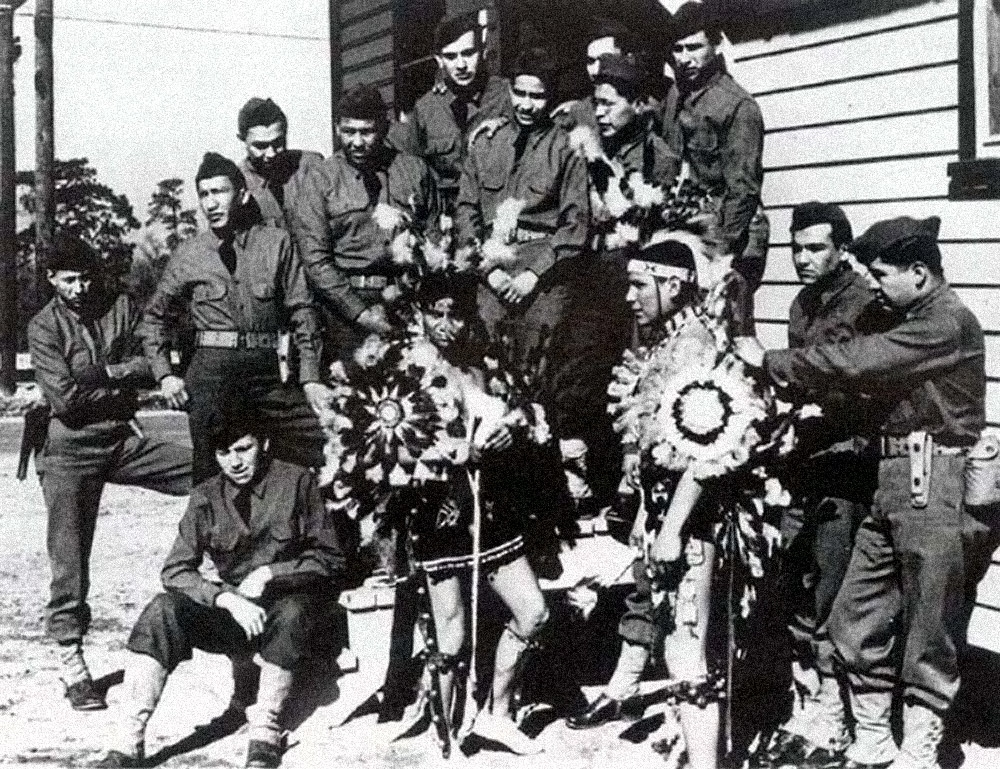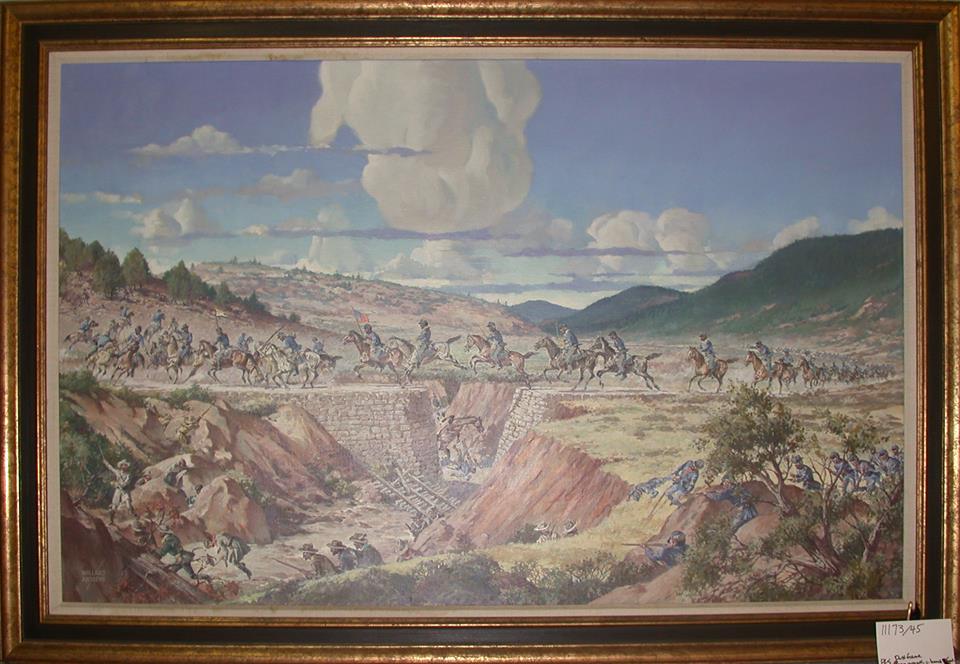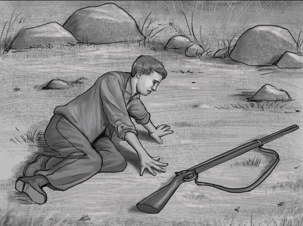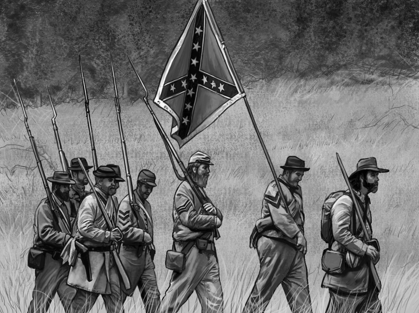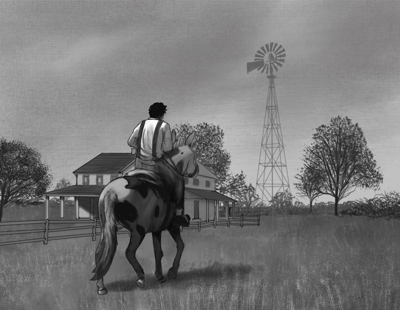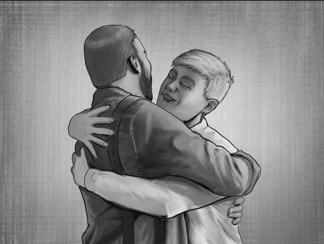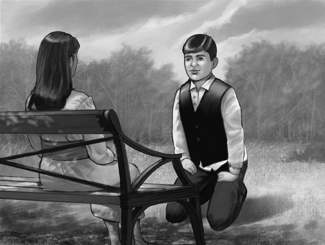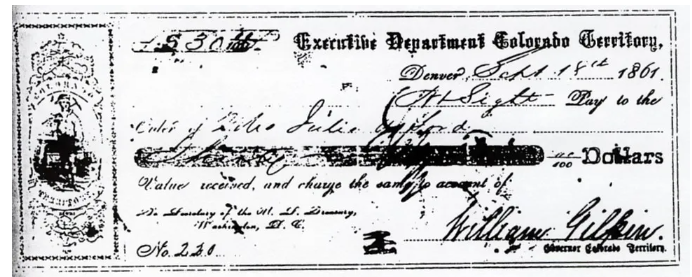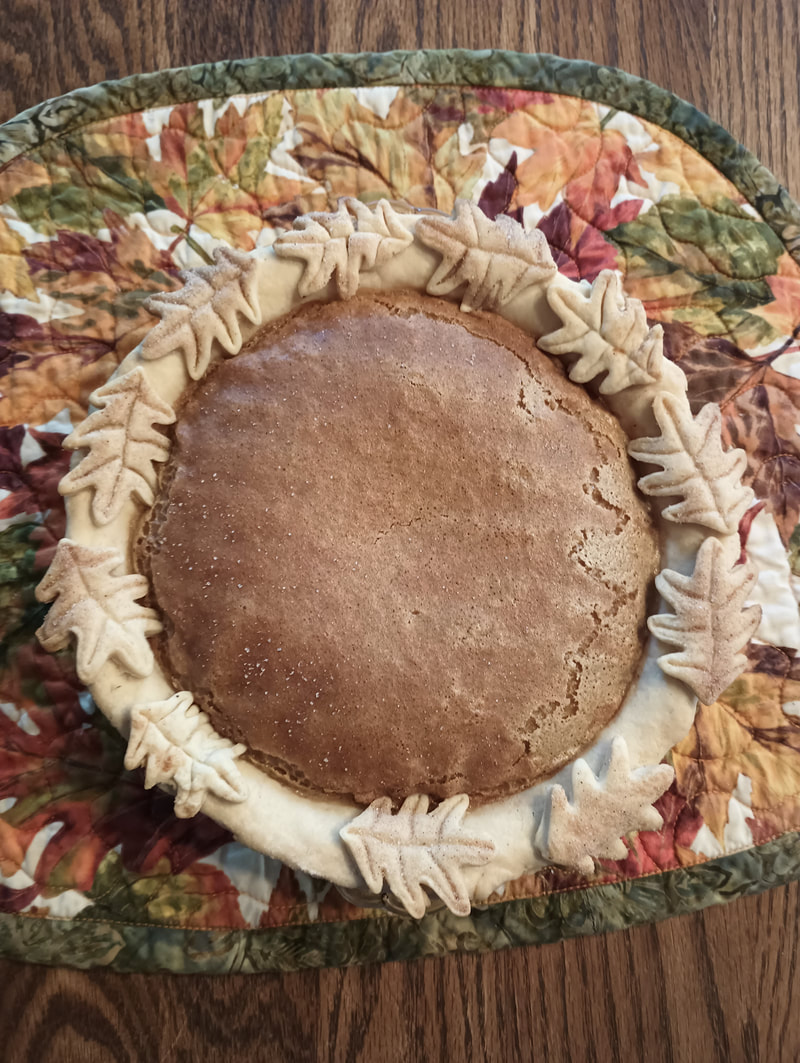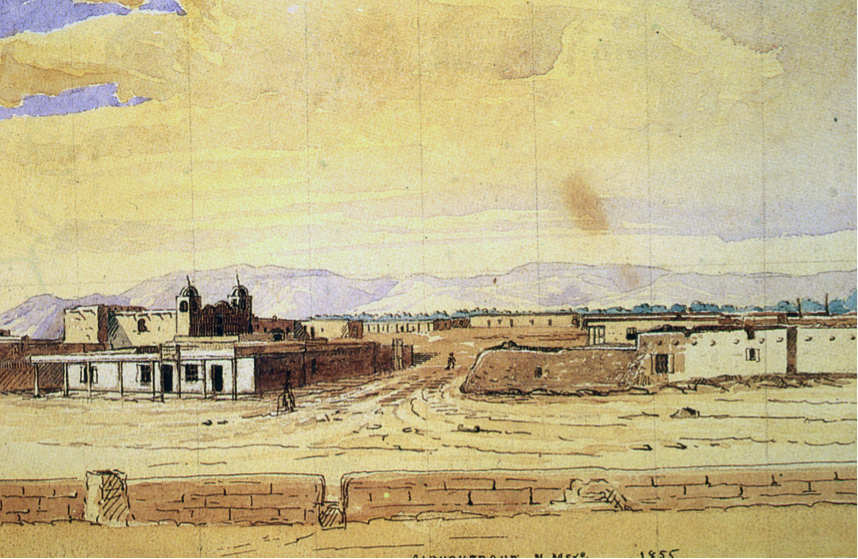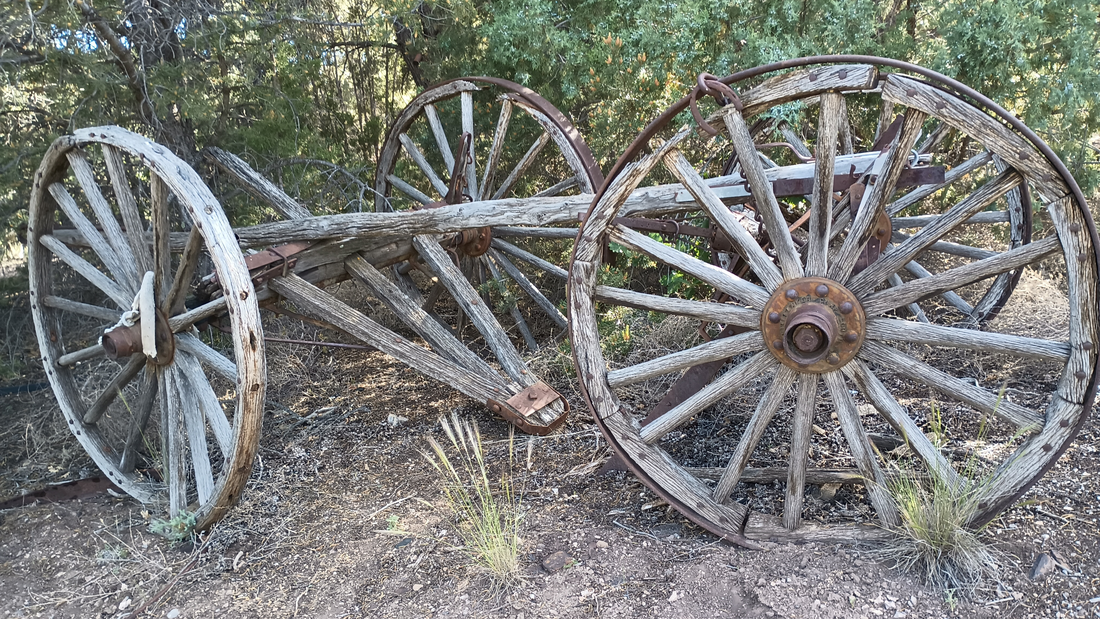
|
Sometimes the most interesting but unknown places are hidden within plain sight. That is certainly true of Albuquerque's Chainsaw Sculpture Garden. Located off Montano, just east of Coors Blvd, the sculpture garden is one of the trailheads for the Paseo del Bosque hiking system. It includes picnic tables and a public restroom. The address is 4100 Montaño Rd NW, Albuquerque, NM 87120. The story of how this sculpture garden came to be is an interesting one. In 2003, some teenagers were playing with fireworks when they inadvertently sparked a wildfire in the bosque. The fire spread to over 250 acres and damaged a lot of land and trails along the riverfront. One of the firefighter who helped to put out the blazes was named Mark Chavez. Chaves is a chainsaw artist in his free time, and thought that turning the charred cottonwood trunks into sculpture honors both the natural beauty of the Southwest and the fire itself. One of the sculptures depicts an eagle rising like a phoenix from the flames.k Another shows a firefighter, perhaps a self-portrait (?) standing upon a slain dragon. This is more significant if you know that the word “dragon” is what being firemen call especially bad fires. There are also sculptures of coyotes, beavers, fish, turtles, roadrunners and cranes, all animals who live in the area. And to remind children to stay out of arroyos, there's a sculpture of La Llorona, the legendary ghost/witch who drowns children who go where they shouldn't, unless a firefighter or other hero rescues them. If visiting the sculpture garden is not enough, you can continue your adventure with a walk along the Paseo del Bosque trail, a 16-mile multi-use trail that runs through the cottonwood forest that follows the banks of the Rio Grande.  When she's not hiking, Jennifer Bohnhoff is writing. The author of over a dozen books, many of which are historical fiction for middle grade readers through adults, Bohnhoff lives in the mountains east of Albuquerque. You can read more about her and her books on her website.
0 Comments
War impacts everyone; world wars, even more so. Now through February, the National WWI Museum and War Memorial in Kansas City is hosting an exhibit which explores the lives of children swept up by the storms of World War I while adults were fighting on the front line and supporting the war effort. 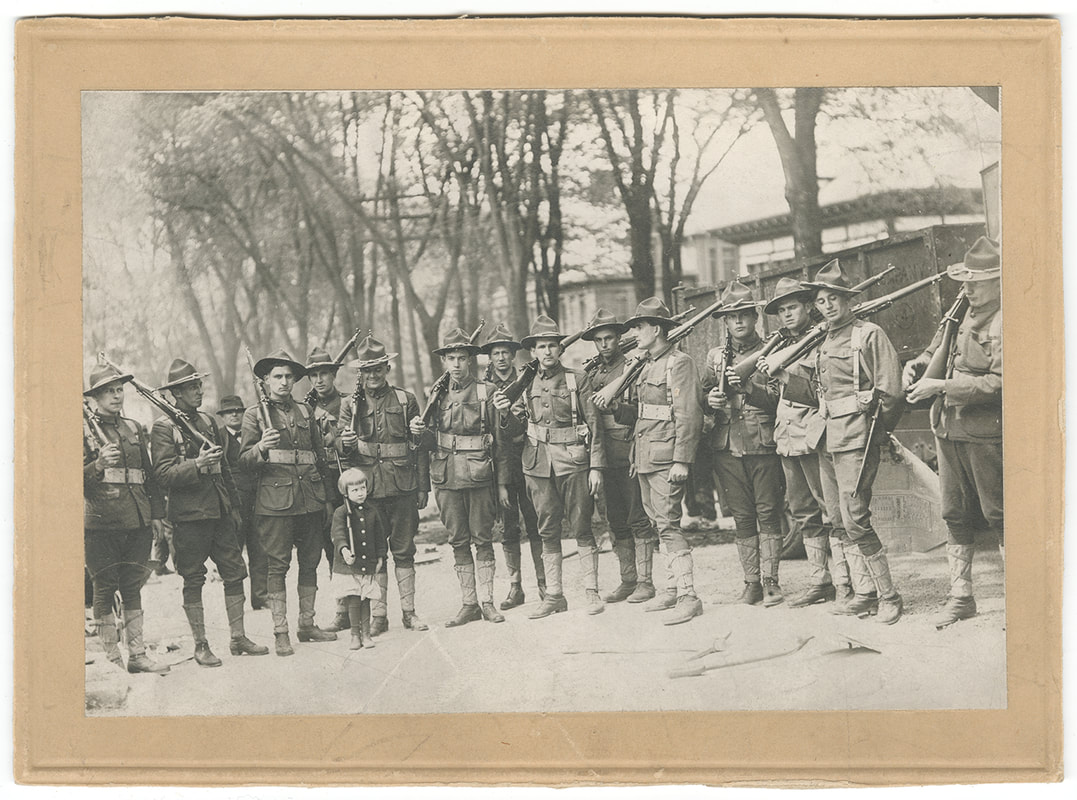 Black and white photograph of American soldiers and a small girl. The soldiers and the girl all hold rifles over their right shoulder. Photo: object 2023.122.1 in the Museum collection. https://collections.theworldwar.org/argus/final/Portal/Default.aspx?component=AAAS&record=16235ede-63d9-4183-b069-bc8362c450f1 Black and white photograph of American soldiers and a small girl. The soldiers and the girl all hold rifles over their right shoulder. Photo: object 2023.122.1 in the Museum collection. https://collections.theworldwar.org/argus/final/Portal/Default.aspx?component=AAAS&record=16235ede-63d9-4183-b069-bc8362c450f1  Although everyone wants to shield children from the horrors of war, it seems that no one wants children to be completely unaware of war. The objects on display for this exhibit clearly show that society wanted children to believe that their fathers and their country were fighting for a just and important cause. People wanted their children to feel like they, too, were fighting for something important. Picture: Joseph D. Marcelli wearing the play uniform made by his father, a tailor in New Jersey. Object ID: 2011.50.1 in the museum collection.  One way that adults tried to indoctrinate children was with uniforms such as the one pictured above. The museum also shows miniature nurses uniforms emblazoned with red crosses, so that girls could also play their part in imaginary war games. Another way that children learned to hate the enemy, and therefore war against him, was by ridiculing the other side. Nursery Rhymes for Fighting Times took common Mother Goose rhymes such as Humpty Dumpty, and adapted them to make the Germans, especially Kaiser Wilhelm, look ridiculous. Such propaganda seems horrible and jingoistic by today's standards. At the time, they were commonplace. The impressionable young minds of American and British children were being fed a clear lesson: that loyalty and commitment would win the war against an enemy that had to be defeated. Molded by the first truly global conflict, the children who grew up during World War I became the adults who had to endure the horrors of World War II. I wonder if they wouldn't have become The Greatest Generation had they not been trained into it in childhood. Located in Kansas City, the National WWI Museum and Memorial is America's leading institution dedicated to remembering, interpreting and understanding the Great War and its enduring impact on the global community. Click here for more information about its collection or visiting the museum.
Jennifer Bohnhoff in an author who lives and writes in the mountains of central New Mexico. She wrote about World War I in her historical novel, A Blaze of Poppies. As we enter November, it is fitting that we remember the American soldiers who fought for our freedom. Some of them fought not with guns and grenades, but with words. Our code talkers helped the Army keep its secrets, so that more of our soldiers came home to be Veterans, recognized on Veterans Day, November 11. What we call Veterans Day began as Armistice Day, the day that World War I officially ended in 1918. At the time that the United States entered World War I in 1917, one-third of the Native population was not recognized by the U.S. government as American citizens. Despite this fact, 12,000 Native Americans volunteered for military service. Some Native Soldiers joined to gain respect as warriors. Others joined because they believed it would prove their patriotism and help them receive citizenship, or to seek a better life for themselves and their families. Few knew that their Native languages would play an important role in the Great War. Code talking began in World War I, after the U.S. Army realized that the Germans were able to quickly intercept and translate messages sent in plain English. In September 1918, during the Second Battle of the Somme, the 105th Field Artillery Battalion, 30th Infantry Division used a group of Eastern Band Cherokees, to send messages between Allied troops in their Native language. The Germans were not able to translate these messages, keeping the Allied force’s locations and intentions secret. Although this is the earliest documented use of Native Code Talkers by the U.S. Army, anecdotal evidence suggests the Ho-Chunk used their Native language in code in early 1918. The Cherokee Code Talkers continued their work until the end of the war. Soldiers from the Assiniboine, Comanche, Crow, Hopi, Lakota, Meskwaki (also known as Fox Indians), Mohawk, Choctaw, Seminole, Creek and Tlingit nations were also used. Col. Alfred Wainwright Bloor, commander of the 142nd Infantry, 36th Infantry Division, later stated that his regiment, possessed a company of Indians who spoke twenty-six different languages or dialects, only four or five of which were ever written. This made it almost impossible for Germans to translate. The best documented group of World War I Code Talkers are the 16 Choctaw Soldiers from the 142nd and the two from the 143rd Infantries. During an attack that ran from October 26 to 28, 1918, Colonel Bloor had these coordinate attacks, including an artillery attack that took the Germans by surprise and resulted in a much-needed victory for the 36th Infantry Division. The most famous of the World War I Native Code Talkers was Pvt. Joseph Oklahombi a Choctaw Code Talker with Company D, 1st Battalion, 141st Regiment. During October 1918, Oklahombi and the 23 fellow soldiers in his company came across a German machine gun nest while they were cut off behind enemy lines. Oklahombi and his company rushed to the enemy’s position, captured it, and used the captured machine gun to pin down the enemy. Four days later, the 171 German soldiers surrendered. Oklahombi was awarded the World War I Victory Medal and a Silver Citation Star for his bravery, and France awarded him the Croix de Guerre. The use of Native Americans as Code Talkers did not end when World War I ended. Several hundred Navajo served as Code Talkers in World War II, many in the Pacific Their language proved unintelligible and unbreakable for Japanese cryptographers, and their radio transmissions were much faster than standard machine-aided shackle encryption. Bill H. Toledo was just 18 years old when he enlisted in the Marine Corps. The Torreon, New Mexico native joined with his uncle Frank Toledo and his cousin Preston Toledo in October 1942. All three would become Code Talkers. Toledo first showed how valuable the Navajo Code was on Bougainville. He also sent messages on Guam and Iwo Jima before he earned enough points to return to the states. Serving was not easy. Some of his fellow Marines made racist comments about Native Americans. After the Battle of Bougainville, when a Marine mistook him for a Japanese soldier wearing a captured American uniform and nearly killed him, Toledo was also assigned a bodyguard. As they had in World War I, other tribes continued to serve as Code Talkers in World War II. Not all soldiers fight with guns and grenades.Words, too, can be a powerful tool in war. But words were not enough for the Native Soldiers who joined to gain the respect of their fellow Americans in the hope that they would receive citizenship. They would have to wait for legal actions. The Snyder Act, also known as the Indian Citizenship Act, which conferred citizenship on Native American people, didn't pass until June 2, 1924, and Native American's right to vote in U.S. elections wasn't recognized until 1948, in the landmark case of Trujillo v. Garley, when an Isleta Puebloan from New Mexico sued for the right to vote. Utah became the last state to remove formal barriers, when they did so in 1962. Still, some states have voter ID laws which require an ID with a physical address. Many people living on reservations do not have physical addresses, only post office boxes. This Veteran's Day, let's remember those soldiers who did not fight with guns, but with words, and all the others who fought to protect freedoms that they did not share in. Jennifer Bohnhoff is a retired educator who now writes historical fiction for middle grade through adult readers. You can read about her and her books here, on her website.
Some Civil War Battlefields have become national parks or tourist attractions, and they have kiosks and guidebooks to walk interested people through the events that happened there. Pecos National Monument strived to do a similar thing with its Glorieta Battlefield Interpretive Trail. Unfortunately for history fans. Much of the battlefield is buried under the asphalt of I-25, or is in private hands. While the Park Service has published a little guide to the interpretive trail, I'd like to add some information about areas of the battle that are outside the Park's boundaries to supplement the park's guide. To follow along, begin driving I-25 east as it leaves Santa Fe. 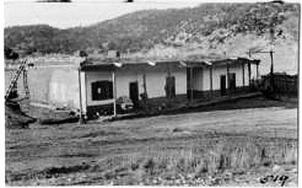 The Battle of Glorieta Pass could just as easily be called The Battle of Three Ranches, because three different ranches played prominent roles in the conflict. The first, Johnson’s Ranch, is no longer standing. This picture is what the ranch looked like in 1914. It would have been located on I-40, a little east of the turn off for Canoncito. Anthony D. Johnson, the owner of the ranch, had served in the Union Army. A Missouri native, he had bought the ranch with his severance pay, married a local woman named Cruz, and had fathered five children. Johnson made his living keeping travelers along the Santa Fe trail, and transporting supplies. When the Confederates arrived, he and his family fled into the hills just north of the ranch, where they could watch what was happening below. They camped until it was safe to return home. Johnson later transported wounded Confederates back to Santa Fe. He later moved his family to Trinidad, Colorado, where he died a mysterious death.  As you drive past the exit, you will see an old church on the left (north). That is Nuestra Señora de la Luz Church, built in 1880, it has a fascinating old cemetery full of unusual molded cement tombstones. If you drive on the little frontage road in front of the church, it turns north and becomes Johnson Ranch Road. The ranch itself was bulldozed in 1967 so that the interstate could go through.  Confederate Major Charles L. Pyron (1819–1869) encamped at Johnson’s Ranch with 200-300 men from the Texas Volunteers 5th Regiment. As he waited for other Confederate units to catch up, he sent a scouting party up into Glorieta Pass. The first day of the battle took place just east of Johnson’s Ranch, in Apache Canyon. At the time of the Civil War, Apache Canyon had a deep arroyo that crossed the road, and there was a bridge over it. 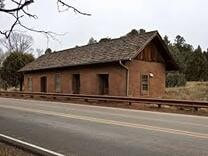 Exit I-40 at exit 299. Cross over the interstate, then turn right to continue towards Pecos on state road 50. After about a mile, you will pass an old adobe that’s on the north side of the road. This is all that remains of Pigeon’s Ranch. Alexander Pigeon (or Valle. No one is really sure what his real name was, and there are legal documents using both) Was born in St. Louis, Missouri, in 1817. He came to New Mexico along the Santa Fe Trail, probably in the late 1830s. He lived in Santa Fe, making his living as a trader, gambler, and land speculator until 1852, when he bought a portion of an 1815 land grant for 5,275 pesos. 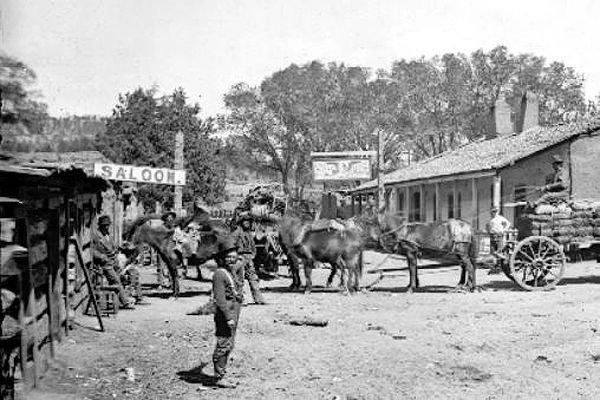 He and his wife Carmen built a large adobe ranch home, an inn large enough to house 40 guests, a tavern, corrals, stables, granaries, and a water well. The Ranch remained a viable hotel until 1879, when the New Mexico and Southern Pacific Railroad constructed a railroad through the pass. It continued to be a tourist destination when route 66 went through the pass, but gave up the ghost after I-25 made it into a backwater. The black and white picture is by Ben Wittrock, and is dated 1880. Early in the morning of March 26, a Union scouting party led by Lt. George Nelson rode to Pigeon’s Ranch, where a very excited Pigeon told them that a Confederate Party had just passed, going east. The patrol doubled back and encountered the three Confederates, who in the gloom thought that the Union soldiers were Confederates. “Are you here to relieve us?” one of the Confederates called. Nelson yelled back. “Yes! We’re here to relieve you of your arms.” He then captured the men and brought them back to Kozlowski’s Ranch, where the Union troops were bivouacked. Kozlowski’s Ranch is the third of the three ranches involved in the Battle of Glorieta Pass. Located on the western side of the pass, it was where Major John Chivington and a 418-man unit from the 1st Colorado Volunteers stopped, waiting for Colonel John Slough to bring the rest of the Union Troops down from Fort Union so they could capture Santa Fe.  Martin Kozlowski came from Warsaw, Poland. Born in 1827, he fought in the 1848 revolution against the Prussians, then became a refugee in England, where married an Irish woman named Ellene. The two immigrated to American in 1853, and Martin enlisted in the First Dragoons, who were fighting Apaches in the Southwest. When he mustered out of the Army in 1858, he used his 160-acre government bounty land warrant to purchase his ranch. Kozlowski grew corn and raised livestock, but a lot of his livelihood came from accommodating for travelers on the Santa Fe trail. A big Union supporter, he was thrilled to host Chivington and his men.  In 1925, the Kozlowski family sold the Ranch to Tex Austin, who renamed it the Forked Lightning Ranch. Tex used Martin’s old Trading Post as the Ranch headquarters. In 1941, "Buddy" Fogelson, a Texas oilman and rancher bought the ranch. He married Hollywood actress Greer Garson 8 years later. Garson donated the land to The Conservation Fund, who donated it to the federal government. When you get to the Pecos Visitor Center, check to see if the Forked Lightning Ranch is open (it isn’t always open, but it has a nice little museum and is worth the visit.) When the Union scouting party returned to Kozlowski’s Ranch on the morning of March 26, 1862, and Chivington learned that the Confederates were encamped only 9 miles away, he decided not to wait for Slough and the rest of the Union army to arrive. They reached the summit of the pass, close to where Glorietta Retreat now is, at around 2p.m, and quickly a 30-man Confederate advance force. Excited by this, the Coloradans rushed into Apache Canyon. The two sides met about a mile and a half west of Pigeon’s Ranch, or six miles northeast of Johnson’s Ranch. The Confederates withdrew about a mile and a half, to a narrower section of the pass that could be better defended. They destroyed the bridge after crossing it. Chivington’s cavalry charged, leaping over the arroyo and sending the Confederates into a panic. They fled to a bend in the road, where they could hold off the Federals and prevent a complete rout. Chivington decided that they were too far from their supply base to risk another attack and fell back to Pigeon's Ranch. In this first day of battle, the Federals sustained 27 casualties (19 killed, five wounded, and three missing), and the Confederates lost 125 (16 killed, 30 wounded, and 79 captured or missing). This small engagement, no more than a two hour skirmish, marked the first Federal victory in the New Mexico Territory. Up to this point, Confederates had won every battle. Having lost about a third of his command, Pyron retreated back to Johnson’s Ranch. He sent a messenger to Lieutenant Colonel William R. Scurry’s column, which was about 16 miles south, at Galisteo. Chivington also sent a messenger, urging Colonel Slough to hurry southward. That evening, both sides called a truce to tend to their dead and wounded. The truce continued unbroken through the next day. Stop in the Pecos National Monument Visitor Center.While you’re there, tour the museum. You can pick up a guide for the Ancestral Sites Trail, an easy gravel path that loops through the old pueblo and church. 1.25 mile, with an elevation Change of 80 ft. There is a free ranger guided tour from 10-11 am most days. Check the website for more information. Also, get the gate code and map to get to the Glorieta Battlefield Trail. The trailhead is 7.5 miles away from the visitor center and behind a locked gate. It is an easy, gravel loop trail that is 2.25 miles around. You can buy a trail guide at the visitor center which will have different information that this guide. 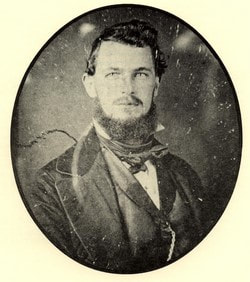 Glorieta Battlefield Trail doesn’t really encompass the entire battle, but some of the third day. I suggest you read the trail guide produced by the Park Service. Here are a few extra notes that might make the route a little more interesting. Marker 2: The trail isn’t set up in a way that presents the battle in order. The actual beginning of the battle occurred west of here. This is where the second part of the battle occurred. The Union had pulled back to here, Artillery Hill, to take advantage of the high ground. Confederate Major John Shropshire was a rich landowner who owned a 750 acre plantation and owned 61 slaves. Born in 1833 in Kentucky, both his parents died of cholera when he was just 3 years old. He was married and had one young son, Charles. He was a very tall man: I’ve seen 6’4” and 6’5”. Shopshire led a flanking movement around the Union forces, then charged up the hill. He and 30 of his men were killed in the fight. One source I read said that Shropshire was shot between the eyes by a Union private named George W. Pierce. Another says that the top of his head was sheared off by a cannonball. In June 1987 a man digging a foundation for a new house just across from the Pigeon Ranch discovered a the body. Archaeologists were called in. They discovered that the skeleton was of a 6’4” (or so) man, and the top of the skull was missing. Shropshire was reburied with military honors at his birthplace in Kentucky, alongside his parents in 1990. Archaeologists then discovered a grave with 30 skeletons, which were reburied in the Santa Fe Veterans cemetery.  Marker 3 Is where the battle actually began. John Slough had decided to use a pincer movement, sending John Chivington and two infantry battalions up Glorieta Mesa, with orders to circle around the Confederates and attack them from behind. He therefore had less men with him to attack the front of the Confederate forces. Scurry believed the Union force was retreating to Fort Union. He decided to go after them, leaving his sick and wounded, one cannon, and a small guard with the supply wagons at Johnson's Ranch. He advanced up the canyon with around 1,000 men. Slough ran into the Confederates here about 11:00 am. Thirty minutes later, the Confederates' numerical superiority managed to push back the Union men to Marker 2’s position. Marker 4 At the same time as Shropshire was storming Artillery Hill, Scurry sent Henry Raguet to attack the Union right, and around 3:00 pm they succeeded in outflanking the Union right and taking what thereafter became known as Sharpshooters Ridge. Raguet was killed, but the ridge allowed Confederate riflemen to pick off Union artillerymen and infantry below them at Piegeon’s Ranch, making the Union position untenable. Slough was convinced that his own men were firing on him at Pigeon’s Ranch. This caused him to resign his commission and return to Colorado within days of the battle. 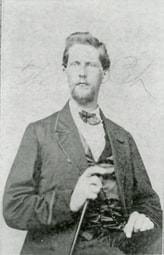 Marker 9 Alfred B. Peticolas kept a multi-book journal of his times with Sibley’s Battalion which included sketches of the places he’d seen. Unfortunately, some of the books were burned at Johnson’s ranch. The Confederates were poorly provisioned, and, coming from Texas, unprepared for how cold New Mexico would be. Many of them wore coats and pants scavenged from Union dead. (The wore the belts upside down, so the US on the belt buckle looked like SN, which they said stood for Southern Nation. This helped distinguish them from Union Soldiers – if you looked close enough. Obviously, Lt. Col Tappan did not.  Lt. Col Samuel F. Tappan was raised in Massachusetts and came from a family of famous abolitionists. A man of high principles, he was the ranking officer and acting colonel when Slough resigned a few days after the victory at Glorieta Pass, but voluntarily relinquished his seniority rights and joined in signing a petition from among the men of the First Colorado to elevate Chivington. He had reason to regret this decision. Tappan headed the military commission that investigated Colonel Chivington for his role in the Sand Creek massacre. He and Gen. Sherman were the two commission members who finalized the Treaty of Bosque Redondo, which allowed the Navajos to return to their homelands, and he worked to assure the rights of the Plains Indians. Marker 10 Slough reluctantly ordered a retreat, and Tappan and his artillery on Artillery Hill covered it. Slough reformed his line a half-mile east of Pigeon's Ranch, where skirmishing continued until dusk. The Union men finally retreated to Kozlowski's Ranch, leaving the Confederates in possession of the battlefield. Control of the Battlefield is one of the factors in deciding who won. Scurry and the Confederates technically won the battle and, had they not lost their supplies, might have been able to push the Union troops back further in another day of fighting. Furthermore, Col. Tom Green’s men, who’d taken an alternative route south of the mountain pass, might have been able to swing around the mountain’s eastern edge and perform the pincer act on the Union Troops that Slough had intended to perform on the Confederates. The Confederate Army might then have been able to push on to the lightly guarded Fort Union, where they could have gotten enough supplies and ammunition to continue on to Colorado, and then California. With gold, and the deep ports of Los Angeles and San Diego, the war might have ended very differently. Jennifer Bohnhoff is the author of Rebels Along the Rio Grande, a trilogy of historical novels based on New Mexico during the Civil War. The second book in the series, The Worst Enemy, includes the Battle of Glorieta Pass.
If you are planning to visit Pecos National Monument and want a printable version of this blog, click here. Three days ago, The Famished Country, book 3 of Rebels Along the Rio Grande, was published by Kinkajou Press, a division of Artemesia Publishing.  I celebrated this new book, and the end of a decade-long project with a Lunch and Learn event at my church, Faith Lutheran Church in Albuquerque. Faith has Lunch and Learns monthly. They are a time for people to get together, listen to a speaker, eat a lovely lunch, and spend some time socializing. I've been blessed to be a Lunch and Learn speaker numerous times over the past years. Yesterday's presentation was entitled The Long Road Home, and it was about the difficult slog of the Confederates once they had their supply wagons burned in Glorieta Pass. The Confederate Army was pushing back the Union forces during the Battle of Glorieta. Given another day of battle, they just might have won and been able to push their way forward, through the canyon and on to Fort Union, the best stocked supply depot in the Southwest. If they'd been able to take the fort and all its ammunition, Sibley's Army of New Mexico just might have been able to press on and take the gold fields of Colorado and the deepwater ports of Southern California. All the big dreams of the big-talking H.H.Sibley would have come to fruition, giving the Confederacy a huge boost in resources and in accomplishments. However, as the third day of battle ended, Scurry and Pyron realized that their supply wagons, left undefended back at Johnson's Ranch, had been destroyed. With no supplies, the rebels had no choice but to retreat back to Texas. On their way, the ragged remains of the army passed through Albuquerque, where the men camped, ironically, in a place named La Glorieta. They engaged Canby's forces in a cannonade there and in Peralta, and then, out of bullets and cannon balls, walked around Fort Craig to avoid another battle that they could not possibly win. Sibley had left San Antonio, Texas in October 1861 with 3,200 men. When he returned to Confederate territory in May, 1862, he had only 1,500 men with him. The rest had been lost to battle, disease, starvation, dehydration, and desertion. Once within Confederate Territory, the army disbanded. It took months for the men to trickle back to their homes. Some of them never made it. It's been a long road for me as an author. I've been working on Rebels Along the Rio Grande for more than a decade now, and I am pleased that the series is complete. I have followed Jemmy back to his reunion with his father, and he, Raul and Cian are all on to new adventures. The Civil War is over for my three protagonists. But I am not all the way home yet, and my mission isn't truly complete. Although I have all three books in print, I still need to complete teacher's guides for books 2 and 3, and I hope to get all three books produced as audio books, so that middle graders who have difficulty reading will also be able to learn about the Civil War in New Mexico. I may still have a long ways to go before I can hang my hat on the peg and call it quits.  Jennifer Bohnhoff is a former educator who now devotes her time to writing. Most of her books are historical fiction, and suitable for middle grade through adult readers. You can learn more about her books here, on her website. 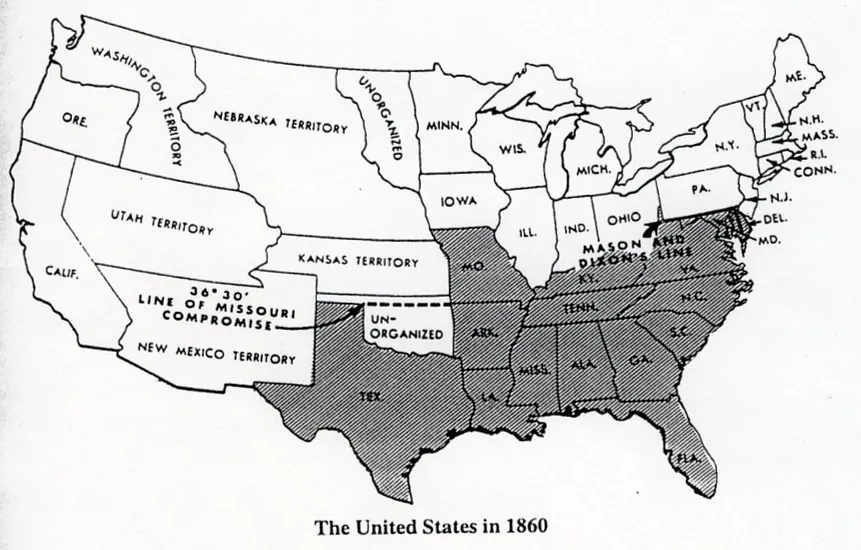 Colorado came to be a territory of the United States in a piecemeal fashion. Its present-day eastern and central areas were part of the Louisiana Purchase, made 1803, while the western portion of the state was acquired during the Mexican War (1846-1848) from Mexico, who had gained control over the area in 1833 when it had won its independence from Spain. Even after all the land was firmly under U.S. control, the area was divided. Parts of present-day Colorado were included in New Mexico and Utah Territories, both organized in 1850. Others were of Kansas and Nebraska Territories, organized in 1854. Until the late 1850s, when gold was discovered in Russellville Gulch in present-day Douglas County and along Cherry Creek near where it joins with the Platte River, Colorado only had about 7,500 settlers. By 1859, an estimated 100,000 men had entered the gold fields. Because many of these men came from Georgia and other southern states, the area had a distinctive lean towards southern sympathies. Five days before Abraham Lincoln became President on 4 March 1861, his predecessor, James Buchanan signed the law that made Colorado a Territory. Two weeks after his inauguration Lincoln, who wanted a pro-Union governor for Colorado Territory, proposed William Gilpin to the Senate, who appointed him, but then recessed before passing any appropriations for the new Territory. Gilpin was left with just a $1,500 contingency fund with which to run the new territory. He arrived in Denver before June and toured the mining camps, discovering that the boom had passed and a new census showed only about 25,000 people including 4,000 white females and 89 Negroes in the territory, most of them concentrated in the Clear Creek, Boulder, and South Park mining districts and in the small but growing town of Denver. On April 12, Confederate forces fired on Ft. Sumter. The U.S. government’s focus shifted to calling up troop in the east, and the needs of Colorado was forgotten. Concerned that the Confederacy would try to conquer the territory for its vast mineral deposits as well as its strategic location, Gilpin began organizing the Territorial military that summer. Morton C. Fisher, his newly appointed Purchasing Agent, was immediately sent out to buy and collect all the arms he could, both supply the new troops and to keep those arms out of the hands of Southern sympathizers. Not having the money to organize and equip the men, Gilpin issued $375,000 worth of drafts, known as Gilpin Scrip, directly upon the United States Secretary of the Treasury. These drafts were used as money in the Territory and were passed along to Washington, who honored payment for some of the script at a value considerably below face value. A year later, this illegal action would cost him his position as Territorial Governor, and he was forced to resign the next year. Gilpin’s intent was to use the money to create the First Regiment of volunteers consisting of ten companies. He appointed John P. Slough to be its Colonel and Samuel F. Tappan, to be Lt. Colonel. Gilpin had planned for John M. Chivington, an elder of the Methodist Episcopal Church, to be the Chaplain, but when Chivington turned down the appointment and requested a fighting commission, he was made Major. The troops were ordered to Camp Weld, a new installation being built about two miles south of Denver. Gilpin’s Script paid for the building of Camp Weld as well as uniforms, arms, supplies and equipment for the troops.  One of the first men to join Gilpin’s new militia was Samuel H. Cook, who convinced 80 men from the gold fields of the South Clear Creek mining district to join with him on a ride to Kansas, where they would join the Union Army and serve under General James Lane. As they were passing through Denver in the middle of August, Cook met Governor Gilpin, who persuaded him to remain in Colorado and join what was becoming the First Regiment of the Colorado Volunteers. Cook’s men became a mounted troop, designated as Company F. In December of 1861, news came from New Mexico that Confederate troops under H.H. Sibley had invaded over the Texas border, two companies of Colorado Volunteers set out for New Mexico. These companies were Captain Theodore H. Dodd’s Independent Company, Colorado Volunteers and Captain James H. Ford’s Independent Company, Colorado Volunteers. Dodd’s Company was sent to Fort Craig, where they resisted a charge of lancers in the battle of Valverde on February 21, 1862. Ford’s Company was sent to Taos and then Santa Fe before being ordered back to Ft. Union. On February 14, 1862 orders arrived that asked that all available forces that Colorado could spare be sent south to aid Colonel Canby, the commander of the Department of War in New Mexico. On February 22, the main body of the First Colorado Regiment, including Captain Cook’s Co. F, set out amid intense snow storms. They arrived at Fort Union on March 10th and were joined the next day by Ford’s Company. Slough would march most of these men south, where they participated in the Battle of Glorieta before joining forces with Canby to shepherd the retreating Confederates back to their own territory, ensuring that both New Mexico and Colorado Territories would remain in Union hands. Jennifer Bohnhoff's trilogy, Rebels Along the Rio Grande, is written for middle grade readers who are interested in the Civil War in New Mexico.
I got a big load of apples from my sister lately. I put up jars of both smooth and chunky applesauce, stowed away bags of peeled and sliced apples in the freezer, and made a batch of apple butter. If you've never had apple butter, you're missing out. Dark, sweet, and redolent with fall spices, it warms your heart and satisfies your tummy. I went online, looking for things to do with apple butter beyond spreading it on toast, and I found a recipe for apple butter pie. The recipe was gluten free, and had many steps that I didn't want to go through, so I took the idea, modified it, and came up with something of my own. Apple butter pie is a custard pie, similar in texture to a pumpkin pie. I think it would be a perfect addition to a fall feast, and a great substitute for those who aren't all that keen on pumpkin. It's also easy, especially if you have a food processor. Give it a try and tell me what you think! Crust: 1 1/3 cups all purpose flour 1/2 tsp salt 1/2 cup shortening 2 1/2-3 TBS ice water 1/2 TBS vinegar Filling: 1 cup apple butter 3 large eggs 1 cup dark brown sugar 1 TBS all purpose flour 1/2 tsp cinnamon 1/2 tsp salt 14 oz. evaporated milk 1 tsp vanilla. Cinnamon Sugar: 1 1/2 TBS granulated sugar 3/4 tsp ground cinnamon Food Processor Method: Preheat oven to 400° Place flour and salt into food processor bowl. Dollop shortening over flour. Pulse 1 or 2 times. Slowly add vinegar through liquid dispenser while pulsing. Add water slowly while pulsing. When dough forms into a solid ball, take it out of the processor bowl, wrap in plastic wrap, and refrigerate for about 10 minutes. Place on a floured sheet of wax paper. Use a floured rolling pin to roll the dough into a circle 3" bigger than your pie plate. Pick up the waxed paper and flip it over atop the pie plate. Ease into the plate. Crimp the edge, or flatten it and brush it with cold water. Use a small cookie cutter on scraps to make shapes to go around the edge or to float on the filing. Sprinkle the shapes with some of the cinnamon sugar. Add all filling ingredients to food processor bowl and process until smooth. Pour into pie crust. If using, add cutouts to pie. Sprinkle filling with remaining cinnamon sugar. Bake at 400°for 10 minutes. Reduce heat to 350° and continue baking for 30-40 minutes, until crust is brown and filling doesn't jiggle when the pie is shaken. Let pie cool for at least an hour before serving. A big dollop of whipped cream really enhances this pie. Mix by Hand Method: Preheat oven to 400° Mix flour and salt in medium bowl. Cut shortening into flour using a pastry cutter or fork until particles of shorting are the size of small peas. Sprinkle with vinegar and mix with fork. Sprinkle with water 1/2 TBS at a time until dough forms into a solid ball. Take it out of the bowl, wrap in plastic wrap, and refrigerate for about 10 minutes. Place on a floured sheet of wax paper. Use a floured rolling pin to roll the dough into a circle 3" bigger than your pie plate. Pick up the waxed paper and flip it over atop the pie plate. Ease into the plate. Crimp the edge, or flatten it and brush it with cold water. Use a small cookie cutter on scraps to make shapes to go around the edge or to float on the filing. Sprinkle the shapes with some of the cinnamon sugar. Beat all filling ingredients together in a bowl until smooth. Pour into pie crust. If using, add cutouts to pie. Sprinkle filling with remaining cinnamon sugar. Bake at 400°for 10 minutes. Reduce heat to 350° and continue baking for 30-40 minutes, until crust is brown and filling doesn't jiggle when the pie is shaken. Let pie cool for at least an hour before serving. A big dollop of whipped cream really enhances this pie. Jennifer Bohnhoff is the author of contemporary and historical fiction for middle grade through adult readers. She also likes to putter in the kitchen. For more information on her and her books, visit her website. For more recipes, sign up for her newsletter.
 The American Civil War may be 150 years ago, but it still fascinates adults and children alike. When people think about the Civil War, they think of Antietam, Gettysburg, and other great battles in the east. They think of the Emancipation Proclamation and the freeing of the Black slaves in the south. With the possible exception of Bloody Kansas, few people are aware that there were Civil War battles east of the Mississippi, but there were. I learned how few people were aware of the Civil War in the west when I taught New Mexico history to 7th graders. My parents were surprised when their children started talking about Civil War battles. Some even told me that I was wrong, and that there were no battles here. There were, and had the Confederacy won them, the war might have turned out very differently. I wrote Rebels Along the Rio Grande because there was such a paucity of material on this subject. Here’s a list of books about the Civil War for middle school readers. Some are fiction. Some are nonfiction. But only mine are about what happened in the New Mexico territory during the war. On this topic, I am out standing, alone, in my field.  Behind Enemy Lines by Seymour Reit Emma Edmonds may be Canadian-born, but when the Civil War begins, she crops her hair, dons men's clothing, and enlists as a spy for the Union Army. Disguised as, among others, a peddler, a slave, and a bookkeeper, she gathers information while risking discovery and death for the sake of freedom. This is fictional, but readers will forget that and be caught up in Emma’s harrowing escapes from discovery.  Spies in the Civil War for Kids: A History Book by Daniel Lewer. Any kid who reads Behind Enemy Lines will want to follow up with this book, where they will learn the facts behind the fiction. It’s fascinating to learn about the clever plots, inventive gadgets, and clever disguises that aren’t always presented in the history books. Lots of full-color illustrations and battle maps draw in reluctant readers.  The Mostly True Adventures of Homer P. Figg by Rodman Philbrick I love Rodman Philbrick’s writing, and this novel is among his best. There’s a good reason it’s a Newbery Honor winner. Homer is a 12 year-old orphan whose older brother, Harold, has been sold into the Union Army. Homer runs away from Pine Swamp, Maine, to find Harold, and finds himself in the company of thieves, scallywags, and spies. In turns funny and sad, readers will be pulled along to the dramatic climax that takes place on Little Round Top during the Battle of Gettysburg.  If Gettysburg is your thing, I recommend you read my novel The Bent Reed after finishing Philbrick’s book. Sarah McCoombs feels isolated and uncomfortable when her mother pulls her from school and allows a doctor to treat her scoliosis with a cumbersome body cast. When the McCoombs farm becomes a battle field and then a hospital, Sarah must reach deep inside herself to find the strength to cope as she nurses wounded soldiers from both sides.  Bull Run by Paul Fleischman is another of my favorite books. The winner of the Scott O'Dell Award for Historical Fiction, an ALA Best Book for Young Adults, and an ALA Notable Children's Book, this novel tells the story of the Civil War’s first great battle from sixteen different points of view representing north and south, male and female, black and white. I’ve used this book in my classroom, assigning the different parts to different students, and it was an emotional experience, especially when some of the voices disappeared and the students knew that they had been killed.  Don't Know Much About the Civil War: Everything You Need to Know about America's Greatest Conflict But Never Learned by Kenneth C. Davis Part of a series of “Don’t Know Much About” books, this book wasn’t really written specifically for middle grade readers, but it is extremely readable, and a great resource for even reluctant students. New York Times bestselling author Ken Davis describes every major event of the Civil War era, but he also includes the little tidbits that students love. A great, encyclopedic book that kids can peruse and jump around through. My trilogy, Rebels Along the Rio Grande tells the story of three boys from different cultures. When his brother sells the family mules to a regiment of Texas Mounted Volunteers, Jemmy Martin becomes a packer, a teamster, and finally a medic as he follows his mules in a desperate attempt to bring them home safely. Raul Atencio is the nephew of a prosperous Socorro, New Mexico merchant who sells goods to the Union Army. He’s delivering supplies when the Confederates arrive and he becomes an unwilling participant in the defense of the Fort. In search of security and a full belly, Irish orphan Cian Lochlann gives up gold prospecting to join the Colorado Volunteers, then finds himself at the Battle of Glorieta Pass, which historians have called the "Gettysburg of the West." This fictional series, heavily based on true events, tells the story of the Confederate invasion of New Mexico from its beginning, presented in book 1, Where Duty Calls, the dramatic climax in The Worst Enemy, right through their final retreat in The Famished Country. Do you know another middle grade book on the Civil War that you could recommend? Leave it in the comments to help other readers.
To celebrate the publication of The Famished Country on October 15, I’m giving away two paperback and two ebook copies of each of my Civil War titles. If you would like one, reply with the name of the book you would like, and whether you want a paperback or digital copy. I would very much appreciate if you left a review on the book you received. Many of the links in this blog post link to Bookshop.org, an online bookseller that gives 75% of its profits to independent bookstores, authors, and reviewers. If you click through these links and make a purchase on Bookshop.org, I will receive a commission, and Bookshop.org will give a matching commission to independent booksellers. If you’re not looking to buy, you can find or request these books from your local library. General Sibley’s Army of New Mexico was in desperate shape when he ordered their retreat back to Texas. Although they had pushed back the Union forces at the Battle of Glorieta Pass on March 26–28, 1862, a Union unit had discovered and destroyed their supply train. By the time his troops rallied in Albuquerque, only had enough food for 15 days and no more than 35 to 40 rounds of ammunition per man. Sibley recognized that they would have to travel quickly and unimpeded if he was to have any hope of making it down the valley and out of the territory. Traveling unimpeded meant getting rid of anything that would slow the army down. With so many of their wagons burned and their mules and horses gone, the decision was made to leave behind eight brass two M1835 mountain howitzer cannons. So that they wouldn’t fall into Union hands and be used against them, the cannons were buried in a corral behind San Felipe Neri Church. On the morning of April 12, the rebel army left Albuquerque. More than a quarter of a decade later, in August of 1889, a Confederate returned.  Major Trevanian T. Teel Major Trevanian T. Teel The man who returned was Trevanian T. Teel, who had served under Sibley as an artillery officer, and had helped to bury the cannons. He now lived in El Paso, and the fate of the cannons rested heavily on him. Teel rounded up a group of locals and went to where he thought he remembered the corral to be. Instead of horses, he found a chile patch belonging to a man named Sofre Alexander. Over Alexander’s protests, the men dug up the field. they found all eight cannons. What exactly happened to these guns is still a subject of speculation. The United States Government gave four guns to the State of Colorado, and the other four to New Mexico. The four Colorado guns are accounted for. All four were originally kept at the Colorado State Museum in Denver. In 1967, two of Colorado’s guns were being readied for a move to the newly restored Fort Garland army post when curators discovered that three of the four Colorado cannon were still loaded, 105 years after they had been buried. An army demolition team from Fort Carson was called in to remedy the situation.  Only two of the four guns given to New Mexico are accounted for. These two stood in the plaza at Albuquerque until the spring of 1983, when it was determined that letting them be handled by the public and subjecting them to the elements was not the best way of preserving them. Then-Mayor Harry Kinney had the cannons removed to the Museum of Albuquerque, where they were supposed to become part of the permanent display. (I have never seen them, and believe they are in storage in the basement.) The two howitzers that sit on the east side of the plaza in Albuquerque’s Old Town are replicas. The remaining two howitzers are missing. They might be the two cannons that stood in the plaza in Santa Fe before World War II, but there is no record showing what kind of cannons those were. The October 15, 1942 issue of the Santa Fe New Mexican reported that the Santa Fe City Council donated two cannons that were 700 lb "monsters" to the war effort. Mountain Howitzers weight only 220 lb each, so these might not be the cannons that had been buried in Albuquerque. In addition to the cannons, it is said that an estimated 300 to 500 weapons recovered from the battlefield at Glorieta Pass were also donated to a World War II scrap drive. The destruction of that many historical firearms saddened me when I read about it. But not everyone thinks as I do. While I was searching the web for information on these guns, I found many blogs calling for the removal of the two howitzer replicas from Old Town. Bloggers suggested that having the cannons there glorified war, or, since they were Confederate pieces, implied an approval of slavery. Maybe Teel should have let sleeping cannons lie.  Jennifer Bohnhoff is a retired history and language arts teacher. She is the author of historical and contemporary fiction for middle grade through adult readers. The Famished Country, book three of Rebels Along the Rio Grande, includes the story of the Battle of Albuquerque and the burying of the cannons.  This week, as I was walking one of the trails behind my house, I came to this behemoth hanging over the path. This downed tree isn't new: it's been there for months. At first, I had to walk around it, which involved a lot of bushwhacking, but then one of my wonderful neighbors went out with a saw and cut off all the limbs. Now, I can duck underneath. (It's not a very deep duck, either. This is a BIG tree, and the space beneath it is close to 5'.) The fact that this tree is still crossing my trail got me thinking, and those thoughts are going to turn into this rant, for which I apologize in advance.  Luis Gonzales in Primera Agua, near Tijeras. Courtesy of East Mountain Historical Society archives. Luis Gonzales in Primera Agua, near Tijeras. Courtesy of East Mountain Historical Society archives. The trail beneath this tree is so wide because it wasn't always a trail. More than a hundred years ago, this trail was a wagon road. Back when the little village of Madera was just downhill from where I live, this road was used by men who cut timber in this canyon. That's where the canyon and the village got their name: Madera is Spanish for lumber. Later, the road was probably used for mining. Signs of old logging are evident throughout my neighborhood and the surrounding woods. Walk anywhere, and you're likely to find piles of old branches that are definitely not just windfall. Their larger ends bear evidence having been sawed, not broken off the tree. It may seem surprising that these limbs might be over a hundred years old, but this is dry country, and wood doesn't decay quickly here. I've been passing some of these wood piles since 2001, and I've seen very little change in them. Walk 20 feet from any of these piles and you will find evidence of an old road. Timelines of the East Mountains, a huge book put out by the East Mountain Historical Society, states that between 180 and 240 woodcutters worked in the forests that are now part of the Cibola National Forest. In 1937, the Forest Service charged woodcutters 25 cents a cord to harvest the wood if it was to be sold. If it was for personal use, the wood was free. Most of the woodcutters' wagons could hold half a cord. One of those old wagons still rests in my neighborhood. Drury Sharp lived in the east mountains in the early years of the twentieth century. He remembers joining a train of wood haulers on their way to Albuquerque. The train spent the night in Tijeras Canyon, camping by the side of the road. The men sat around a fire, which customarily was fed by the wood haulers, who took turns throwing in logs from their wagons. Dinner was a communal meal of shared tortillas, coffee boiled in a lard pail, and a frying pan of pinto beans and chili. Most woodcutters made the trip into Albuquerque 40 to 60 times a year, with each of their loads worth between $2 and $3.50. Despite the fact that wood cutters weren't making huge amounts of money, it's obvious that they took their time doing their job. Even in the places where I find large piles of branches, there are large, old trees standing. It's obvious that the men who worked these mountains never clear cut their trees, but selectively left some for future generations. I believe this kept the forests healthy, giving the trees they left behind more air and sunlight in which to thrive. Enter the Forest System. It is no longer legal to harvest wood on the forested slopes behind my house, and it needs to be done. In the two decades that I have been walking these trails, I've seen the forest go from a healthy, open forest to one that's choked with downed and dying trees. The bark beetle infestation of the last few decades certainly didn't help; there are some parts of the forest with more dead trees than live ones. But no one is harvesting these downed trees, and they lie across trails, choke streams, and present a real fire danger for the forest and nearby communities.  My middle grade fantasy Raven Quest is based on the history of the village of Madera. In it, the villagers harvest wood from the mountains just as the actual villagers did. Savio, the main character, walks through the same forests that I walk through and he, just and I have, notices the piles of branches and the trees that have been passed over. At one point, he uses a magic lens to see the wood cutters transformed into beavers busily harvesting trees. I think if the beaver people from Raven Quest or the people who lived in the once-thriving village of Madera were to find a tree blocking their path, they would do the right thing: they would cut it up, load it onto their wagons, and haul it out so that it could heat someone's house or be made into roof vigas or furniture. A tree as big as the one I photographed could be turned into many cords of wood. I know of at least one busy beaver neighbor of mine who would be happy to cut this tree up and haul it out, if only he could. Jennifer Bohnhoff writes books for middle grade through adult readers. You can read more about her book here, on her blog.
|
Don't see what you're looking for?
I am in the process of moving all my blog entries to a different blog site. Eventually, this page will go away. If you're looking for something and it's not here, try my new site, or email me and suggest I write a blog on the topic you are interested in. 
ABout Jennifer BohnhoffI am a former middle school teacher who loves travel and history, so it should come as no surprise that many of my books are middle grade historical novels set in beautiful or interesting places. But not all of them. I hope there's one title here that will speak to you personally and deeply. Categories
All
Archives
March 2025
|
